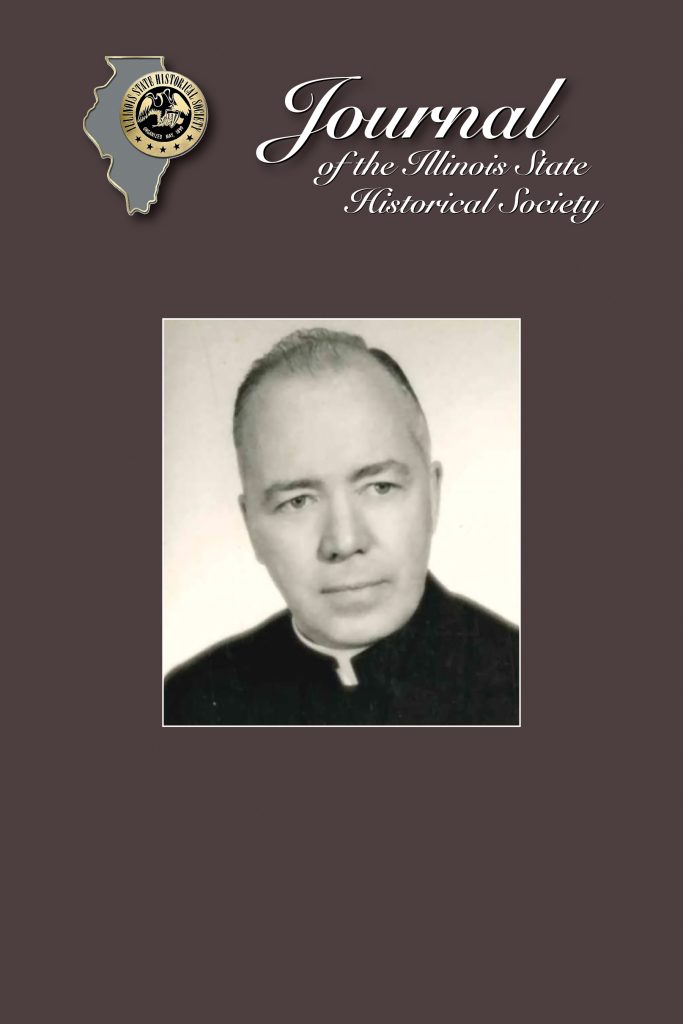The Journal of the Illinois State Historical Society (JISHS) invites submissions for its upcoming issues. Established in 1908, JISHS is the peer-reviewed scholarly publication of the Illinois State Historical Society. The Journal seeks to preserve, promote, and publish the latest research about the Prairie State and the Midwest.
JISHS welcomes articles, essays, and documents on a wide range of subjects related to Illinois and the Midwest, including historical topics focusing on the state of Illinois, as well as studies involving literature, art, technology, law, or other subjects.
Special Feature: Chicago Articles
Editor Robert Sampson recommends the following four featured articles as exemplar articles showcasing the quality scholarship presented in the Journal. Notably, while these articles center around Chicago, the Journal publishes on topics related to the entire state of Illinois and surrounding areas.
Kevin Ryan’s article “A Missed Opportunity in the Catholic War on Poverty: Chicago’s Archdiocesan Inter-Parish Movement” examines a failed effort in the 1960s to unite poor inner-city parishes with affluent ones to combat poverty and racism. Despite the program’s goal of bringing people together, racial tensions in Chicago during this period often led to violent reactions from white ethnic neighborhoods to the movement of Black citizens into their enclaves. This article will be freely available to read from June to the end of August 2023.
In “Slide Rules: Adults and Children on Chicago Playgrounds,” Cate LiaBraaten explores the Progressive reformers’ perspective on the layout of children’s playgrounds. Progressives believed that playgrounds should have adult supervision and activities that protected children from social issues prevalent in urban areas. LiaBraaten’s article shows how the playground movement was part of a larger reform effort that included park and landscape design. This article won the Illinois State Historical Society’s 2021 Harry E. Pratt Outstanding Article Award. This article will be freely available to read from September to the end of November 2023.
Patrick T. Reardon defends Charles Yerkes, a despised financial baron, and praises his commitment to the elevated train in Chicago and to the tube system in London in his article “Rediscovering the Art of the Much-Demonized Chicago Wheeler-Dealer Charles Tyson Yerkes.” This article will be freely available to read from December to the end of February 2024.
Finally, in “‘Greasy Thumb’—The Man Who Made the Chicago Mob,” James S. Pula delves into the unexpected ascent Jacob “Greasy Thumb” Guzik to a leadership position within the al Capone gang, even though he claimed to never carry a gun. Guzik not only outlasted Capone, but also played a crucial role in the expansion of Mob activities after Prohibition ended. This article will be freely available to read from March to the end of May 2024.
For a broader geographical context, the following additional articles may be of interest:
In the article “A Sacrificial Lamb? James M. Taylor Runs for Congress in 1884,” Glenna R. Schroeder-Lein recounts the quixotic congressional run of the Taylorville Republican attorney.
Taylor, a Scottish immigrant who lost an arm during the Civil War, had a law practice in Taylorville and was a staunch Republican. However, he faced a tough opponent in the incumbent Democrat, William M. Springer.
Roger Biles discusses the devastating effects of deindustrialization on the city of East St. Louis in the article “Deindustrialization and the State Bailout of East St. Louis.” Once a thriving manufacturing center, the loss of the city’s tax base made it difficult for the administration to avoid bankruptcy. In 1990, the state government, led by James “Big Jim” Thompson, passed legislation that permitted state supervision of city budgets in East St. Louis. Biles explains the reasoning behind this decision, including the legislative maneuvers that led to the passage of the Illinois Financially Distressed City Act, and evaluates its consequences.
Submit Your Work
Submissions should be original, unpublished work and should adhere to JISHS’s style and formatting guidelines. Authors should follow The Chicago Manual of Style, 17th ed. or imitate notes found in recent Journal issues, using endnotes. Authors who desire illustrations should provide them. Articles average 12,000 words (including notes) but we have accepted articles from 4,000 to 15,000 words. The Journal prefers to work with electronic files of manuscripts.?
JISHS submissions are sent to qualified readers in the respective field. Readers’ reports are normally received back within two months. Accepted articles will be published in print and online, reaching a broad audience of scholars, historians, and enthusiasts.
Please submit your manuscript via e-mail to: journaleditor@historyillinois.org.

